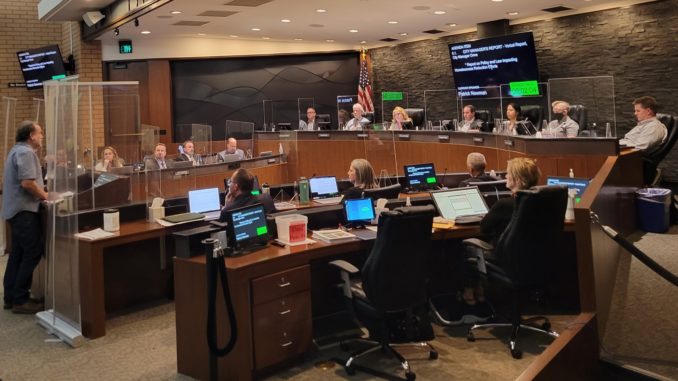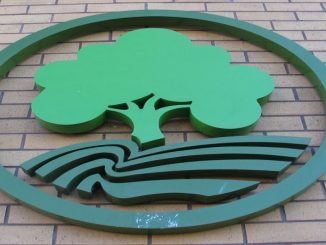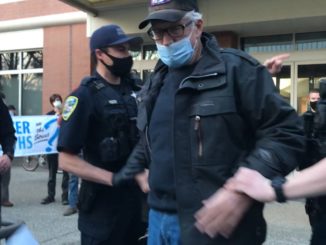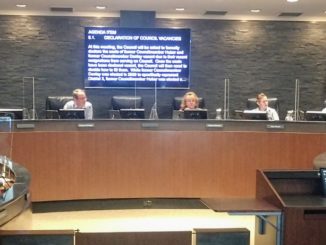
Patrick Newman is a mainstay at Chico City Council meetings. Founder of Chico Friends on the Streets, he’s a relentless advocate for unhoused members of the community. Meeting after meeting, year after year, Newman has pushed council members—progressives and conservatives—to address root issues underpinning the homelessness crisis.
He did so again Tuesday night (Sept. 21). From the public speaker’s podium, Newman challenged the comments of several business owners that homeless Chicoans are driving away residents and businesses. (“The idea of a mass exodus doesn’t sound bad to me but is fiction,” he said, citing the hot real estate market.) He also spoke against the proposed ice rink in City Plaza, a site he called “a downtown resource for people dumped on the street,” and criticized a report on homelessness submitted by city contractor, Hope Street Coalition.
Council members did seize on Newman’s remarks, but not about the issue he’s long pleaded. Instead, they ran with a notion he posed during the Climate Action Commission appointments portion of the meeting, which took their discussion in a surprising, if not wholly unexpected, direction.
“I think the commission should be disbanded,” Newman told the council, calling it “environmental ritualism” that doesn’t address substantive matters on climate change, such as opposing the expansion of the Chico Municipal Airport. “I [haven’t seen] anything honest come out of it.”
Vice Mayor Kasey Reynolds asked what it would mean for the city to disband the commission. Community Development Director Brendan Vieg explained the commission’s parameters—focusing on greenhouse gas emissions for the city to meet state requirements, along with preparing and monitoring state-mandated climate action and climate resiliency plans—as well as its evolution from the Sustainability Task Force, a long-standing panel that met as needed, as an ad hoc committee.
Councilman Sean Morgan made a motion to turn the Climate Action Commission into an ad hoc committee, seconded by Reynolds. Councilwoman Alex Brown, the lone progressive, asked if this action could be taken at a future meeting when it would be explicitly on the agenda; City Clerk Debbie Presson explained that because an ordinance established the commission, the council must take two votes, at separate meetings, to enact the change.
The motion passed 5-2, opposed by Brown and newly appointed Councilman Dale Bennett, who served on both the Planning Commission and the Architectural Review and Historic Preservation Board.
Newman also spoke in favor of the sales tax increase on the evening’s agenda, which the council unanimously decided to put on the ballot next year. Residents will decide by simple majority whether to add 1 percent with the money going the general fund for the council to allocate.
“I don’t always agree with Mr. Newman; in fact, a lot of times we don’t,” Reynolds told the CN&R afterward. “When he came up [during the Climate Action Commission deliberation] and said, ‘I don’t know why you’re doing this,’ I had heard from staff in previous years about all the things that we’re doing to work on our climate action, how many other places that it’s talked about in the general plan and all the other things that we need to do—when he said that, just on the spur of the moment, it was like, ‘Well, what would it look like to take it back to a committee?’
“It’s not going away,” she added. “It’s just going back to the way it was done before two years ago.”
Brown made her feelings clear on social media. Following the decision, she tweeted: “So, Council just voted 5-2 to disband the Climate Action Commission. Given that the item on the agenda was to make appointments to the Commission, even I was surprised by this one. But hey, at least we’ll have an ice rink during one of the biggest droughts we’ve seen in … ever.”
Ice rink
Discussion of the downtown ice rink, approved with no controversy in the June budget deliberations but hotly debated at the Sept. 7 council meeting, drew more proponents than opponents to the chambers. Most notable was 85-year-old Carol Bingman, who eschewed her walker as she shuffled to the podium to register support. If the council didn’t cancel it, she said, “I would be one of the first people to get on the rink.”
At the previous meeting, Morgan raised concerns about attendance due to COVID-19 and perceptions about safety downtown. He made a motion, approved by his colleagues, for staff to bring to this meeting the extent of the city’s financial commitment in order to ascertain “sunk costs” should the council cancel the contract. The answer: $99,887.
Supporters, primarily from the Downtown Chico Business Association, pointed to the prospect of a boost to foot traffic and revenue. Businesses will try to help offset $427,000 in costs through potential sponsorships. Bob Murdoch, interim director of public works for engineering, said $300,000 budgeted for sponsor revenue is “conservative” with $60,000 lined up already. Overall revenues project at $579,700 per the staff report.
Detractors pointed not only to the impact on homeless people who frequent the plaza but also the environmental impact. City staff reported the rink will use 8,000 gallons of water initially, then replenish with 50 to 100 gallons a day over the course of its eight weeks of operation starting Nov. 19. Staff estimated electricity use at 400 kilowatts daily, which the staff report equated to “the energy needed for 10 to 15 single family homes.”
In the end, Bingman proved most persuasive, with Councilman Michael O’Brien calling her out specifically in explaining why he’d approve the rink. Reynolds said she anticipated voting no but “absolutely turned around” after what she heard. Brown was the only dissenter in the 6-1 vote.
“There were some questions that I had,” Reynolds told the CN&R. “I wasn’t sure if DCBA was going to have the time—could they get the staff? What were the downtown business owners thinking? But then hearing the comments, I think it’s important we respond to that. And, of course, how could you vote against the 85-year-old lady who came here for her first council meeting ever?”
The perennial ice rink in Paradise also came up during public comments.
“Ultimately we [on the council] are beholden to the city of Chico taxpayers,” Reynolds said. “While I go up to Paradise, I go to breakfast up there, I buy plants up there—there’s lots of things I do to support their community—we are able to support our community and do nice things for our community also.
Sales tax
Newman, while contesting derogatory narratives about homelessness, told the council that “the biggest threat to Chico is the revenue shortfall,” which he called a “cancer” that’s afflicted the city for a decade. When City Manager Mark Orme proposed a 1 percent addition to the sales tax, Newman was among those in favor , saying he could not believe the last council majority “couldn’t get it on the ballot” in 2020.
“If [the city] collected that sales tax the last 10 years, [Chico] would not be in a hole,” he said, referencing a $200 million backlog in infrastructure repair. Later in the meeting, Murdoch presented a report showing city roads rating poor—with a pavement condition index average 49 out of 100—compared to a rating of 68 among cities statewide. He said Chico is $163 million behind on its roadways.
Of the tax increase, Morgan prognosticated, “I don’t think it will pass. I don’t think the sales job can be done.” Saying he “probably won’t vote for it as a citizen,” Morgan nonetheless joined the rest of the council to approve a ballot measure, adding: “The onus is put on the city to promote it.”




Ice Rink: What are the particulars of the $427,000 costs? $60,000 in sponsorships are “lined up” – How aggressive has the DBCA been in “lining up” the other $240,000, and how confident are they in achieving that goal. What was the current city outlay of $99,877 used for, and what are the line item expenses for the additional $327,113 in costs, and finally, what is the breakdown of the “projected revenues” of $579700. As for the 1% tax increase, if passed, is the city will to commit now haw it will be spent?
This summer, the News & Review reported that west of Chico, wells were going dry somewhere out by Hamilton City.
And on September 13, 2021, The New York Times reported that reservoirs in California were half full; that the federal government cut water allocations from its Central Valley Project to cities and farmers by 75 percent.
Question: At the end of the holiday ice skating season, will the water be salvaged and shipped in tankers to where people may need it?
I live a long way away now, but I loved living in Chico, even when I returned from the Bay Area to work in poverty. I still remember, fondly, a five-minute lunch break. Why I can’t remember. Something to do with workers’ rights and winning an unemployment claim, I think.
Question: Who wants to build an ice skating rink during an exceptional drought? People who cheer on wannabe despots? Or the fatuous?
Could it be both?